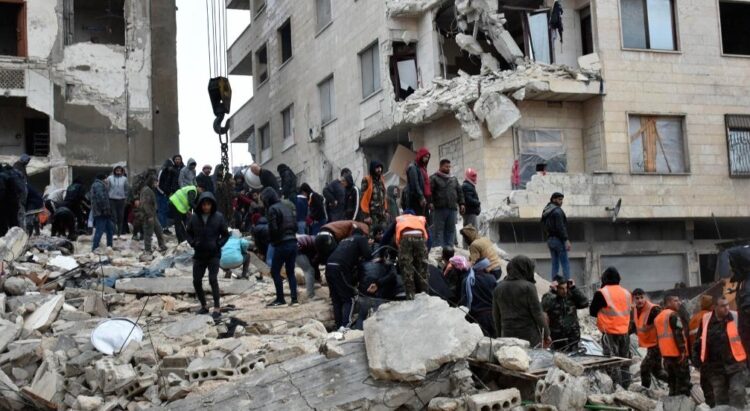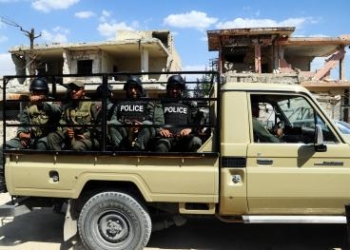Ankara/Damascus: The number of fatalities from Monday’s devastating earthquakes that struck Turkey and Syria has surpassed 12,000, as chances have become smaller to find more survivors in cold weather before the golden 72 hours are over.
Rescuers and volunteers are working round the clock to locate the trapped under rubble as the survival rate without food or water drops drastically after the 72nd hour, which is rapidly approaching. Experts have warned that the 72-hour window for rescuing those trapped by the earthquakes may be much smaller than anticipated, given the low temperatures that have swept through the earthquake-hit regions will increase the risk of hypothermia.
According to the latest statistics, Monday’s devastating earthquakes in southern Turkey and northern Syria have killed 9,057 people in Turkey and 3,480 in Syria, Xinhua news agency reported.
The search and rescue teams from more than 65 countries have arrived in the Turkish earthquake zones to offer assistance in quake-relief efforts, according to an official statement.
A plane carrying a 83-member rescue team from China and 20 metric tons of disaster relief materials and equipment arrived in the city of Adana in southern Turkey in the early hours of Wednesday. In addition to materials and equipment for search and rescue, communication and medical treatment, they also brought with them four rescue dogs.
Volunteers flocked to southern Turkey hit hard by the earthquakes. Photographs show terminals crowded with volunteers trying to help, while the roads leading to the affected areas were clogged with long queues of vehicles ready to transport supplies or offer assistance.
“It was good that we came. When we arrived, the area was rubble everywhere,” said a volunteer who identified himself as Kerem Okyay, a businessman from the central Turkish city of Sivas who hurried to Elbistan, a town about 200 km away.
Located in the southern Turksih province of Kahramanmaras, Elbistan was the epicentre of the 7.6-magnitude quake that rocked the region on Monday and close to the town of Pazarcik, the epicentre of a 7.7-magnitude one hour earlier.
“We formed a team with some friends as soon as we heard the news of the earthquake and came here as volunteers,” Okyay told Xinhua.
Soon after their arrival, the team saved two people from the debris. “We were focusing on areas where we could hear people,” he said.
In the heavily damaged city centre of Kahramanmaras, the name-sake capital of Kahramanmaras Province, sniffer dogs equipped with small GPS-enabled harnesses were leading rescuers in the search for survivors from site-to-site in the winter cold.
While rescue operations are taking place in Turkey and Syria, more countries have committed to providing assistance.
A Lebanese ministerial delegation headed by Foreign Minister Abdallah Bou Habib arrived in Damascus on Wednesday to discuss with Syrian officials more possible aid for earthquake-stricken Syria.
On Wednesday, Tunisia sent its third aircraft, which was packed with tonnes of emergency humanitarian aid, including food, medication, blankets and clothing, to Syria. Two military planes from Tunisia were already sent to the two earthquake-stricken countries on Tuesday, carrying medical teams, rescue teams and urgent humanitarian aid.
Saudi Arabia launched on Wednesday a donation campaign to help earthquake victims in Syria and Turkey. According to local press, a total of 25 million Saudi riyals ($6.7 million) had been donated to the campaign so far.
Jordan announced on Wednesday that it would send aid convoys over the next few days to quake-hit areas in Syria and Turkey, while Sudan said its Civil Defence Forces is ready to send a specialised team to Turkey to help with rescue efforts.
David Saranga, Head of the Israeli aid delegation to Turkey, said on Wednesday that two Israeli rescue teams are searching for survivors in the country, while a field hospital complete with 15 Israeli aircraft and about 230 personnel is expected to be established by Thursday or Friday, according to the Israeli military and foreign ministry.
Turkish President Recep Tayyip Erdogan admitted on Wednesday that there were some problems in the first-day response to the earthquakes.
Operations are currently back to normal, Erdogan said in Kahramanmaras Province, the state-run TRT broadcaster reported.
Earthquake victims can temporarily stay in hotels in the Mediterranean tourism hub of Antalya and southern province of Mersin, he added.
The Turkish President announced that each quake-stricken family would receive 10,000 Turkish liras ($531), and new homes will be built in the 10 provinces affected by the disaster within a year.
On Wednesday, Erdogan said it was impossible to get prepared for a calamity like the earthquakes that struck the country on Monday, but he vowed to exert utmost efforts to save citizens’ lives.
“There are deficiencies … It is impossible to be prepared for such a major disaster,” he told reporters in the southern province of Hatay, which was hit hard by the earthquakes.
“We will not leave any of our citizens unattended. We will carry out disaster management by taking every necessary step so that no one will suffer,” he added.
(IANS)


















